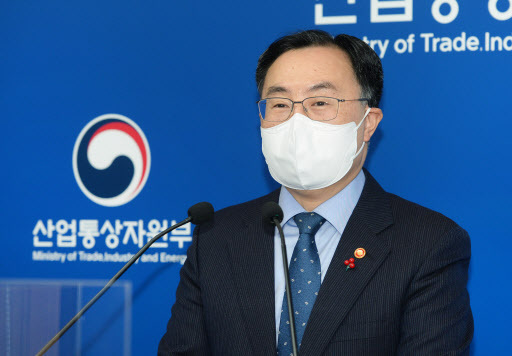 |
Moon Sung-wook, minister of trade, industry and energy, speaks during a new year press meeting held in the central administrative city of Sejong on Jan. 25, 2022, in this photo provided by his office. (Yonhap) |
South Korea remains committed to its policy of phasing out nuclear power plants as part of efforts to achieve carbon neutrality, the country‘s energy minister said Tuesday.
Moon Sung-wook, minister of trade, industry and energy, reaffirmed there will be no change in the Moon Jae-in government’s nuclear phaseout policy hours after main opposition presidential candidate Yoon Suk-yeol said he will scrap the plan if elected and seek to increase nuclear power generation.
“The basic direction of the energy transition plan that the government decided in 2017 is not to increase nuclear power plants from the current level,” the minister said in a new year press meeting.
South Korea has pushed to boost the supply of power from clean and renewable energy sources while weaning the country off nuclear and coal-fired plants.
South Korea -- which decommissioned two nuclear power plants in 2017 and 2019 -- is set to reduce the number of nuclear plants to 17 by 2034 from the current 24.
He also reiterated the stance “not to consider adding things” with regard to parts of nuclear power plants whose life spans are coming to an end but said such decisions will be made through discussion with operators.
Earlier, Yoon of the conservative People Power Party said if elected president in March, he will do his utmost to reduce fine dust pollution by abolishing the government‘s policy to phase out nuclear energy and expediting the reduction of coal-fired power generation as much as possible.
Minister Moon said that it is “not appropriate” for a government official to comment on remarks by presidential candidates, saying the policy remains unchanged not to increase nuclear power plants until such complex issues as the treatment of high level radioactive waste can be tackled.
“As shown in overseas cases, many countries have failed to find a place for the treatment of high level radioactive waste and even when they did, the plan soon returned to the drawing board,” he said.
“It is not easy to find such a place ... in a country like ours that has a small land size, so it is necessary to have more careful preparations,” he added. (Yonhap)








